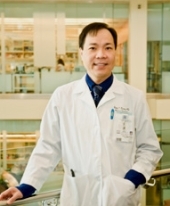Back to Editor profile » Dr Hung Khong
Dr Hung Khong

Dr Hung Khong
Editor-in-Chief: Dr Hung T Khong
Dr Khong is an associate professor in the Division of Medical Oncology at the Huntsman Cancer Institute (HCI) of the University of Utah, where he treats patients and conducts translational research in melanoma, breast cancer, cancer immunotherapy, and targeted therapy. Prior to joining HCI in December of 2011, he was an associate professor at the University of South Alabama Mitchell Cancer Institute where he took on various leadership roles including head of Clinical Immunotherapeutics Research Laboratory and interim-chief of Medical Oncology Service. Dr Khong stepped down as associate director for clinical research in 2010 to devote more time to his clinical trials.
Dr Khong received his BA in biology from the University of Pennsylvania in Philadelphia. Four years later, he graduated from Temple University School of Medicine, followed by an internal medicine residency at Baylor College of Medicine in Houston, Texas. Next, Dr Khong received an appointment to the National Cancer Institute in Bethesda, Maryland, where he excelled as a clinical fellow in both the medical oncology branch and the surgical branch. He was the recipient of the Senior Clinical Fellowship Training Award, an extremely competitive three-year training grant presented to the most outstanding fellows at the Center for Cancer Research at NCI.
While at the NCI, Dr Khong cloned a previously unknown TRP-2 mRNA isoform (TRP-2-6b) that contained two novel exons alternatively spliced from the sixth intron between exons 6 and 7 of TRP-2 mRNA. The isoform encoded an HLA-A2-restricted antigenic epitope recognized by anti-melanoma T cells. He also identified, for the first time, the presence of de novo cellular immune reactivity against the transcription factor SOX10, using tumor-infiltrating lymphocytes obtained from a patient who experienced a dramatic clinical response to immunotherapy.
At the Mitchell Cancer Institute, Dr Khong developed a simple yet universal approach termed "chemocentric chemoimmunotherapy" that has potential application in the treatment of all cancer types. This technique uses nonspecifically activated CD4(+) T cells as a chemosensitizer before the administration of chemotherapy. Dramatic enhancement of the cytotoxic effect of chemotherapeutic drugs, either active or nonactive as single agents, was observed both in in vitro and in vivo human tumor xenograft models. His team also cloned MITF-Mdel, a novel melanocyte/melanoma-specific isoform of microphthalmia-associated transcription factor-M that may serve as a candidate biomarker for melanoma.
Dr Khong is also actively involved in clinical research where he has served as principal investigator on multiple clinical trials, particularly in breast cancer and melanoma. Based on his interest and research on SPARC protein expression by tumor and its microenvironment and on epigenetic regulation of SPARC gene, he has developed several protocols in the treatment of solid tumors and breast cancer. Thus far, these pilot studies have yielded impressive results.
